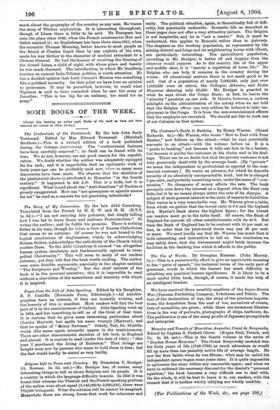Belgian Life in Town and Country. By Demetrius C. Boulger.
(G. Newnes. 3s. 6d. net.)—Mr. Boulger has, of course, many interesting things to tell us about Belgium and its people. It is a country in which the language difficulty is acute. In 1900 it was found that whereas the Flemish and the French speaking portions of the nation were about equal (3,145,000 to 2,830,000), there were 770,000 bilinguals. What the solution will be cannot be imagined. Meanwhile there are strong forces that work for coherence and unity. The political situation, again, is theoretically full of diffi- culty, but practically endurable. 'Domestic life as described in these pages does not offer a very attractive picture. The Belgian is not hospitable, and he is "not a reader." But, it must be understood, this applies to Brussels rather than to Antwerp. The chapters on the working population, as represented by the mining district and Liege and its neighbouring towns with Ghent, are particularly interesting. The agricultural population, according to Mr. Boulger, is better off and happier than the observer would suppose. As to the country life of the upper and middle class, it is " merely a repetition of town life." No Belgian who can help it remains in the country during the winter. Of educational matters there is not much good to be said. Out of a population of nearly 7,000,000, only just over 1,000,000 were at school, the Colleges, Athenees, and Ecoles Moyennes claiming only 25,000. Mr. Boulger is guarded in what he says about the Congo State; in fact, he leaves the "atrocity" question on one side. It throws, however, a curious sidelight on the administration of the colony when we are told that the Belgian officer can very seldom be induced to take em- ployment in the Congo. It is from the non-commissioned officers that the employes are recruited. We should not like to work one of our Colonies on that system.






































 Previous page
Previous page